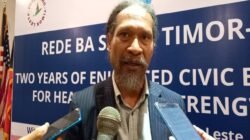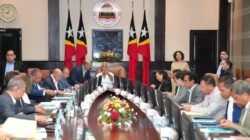Perspective of an Islander — Beijing+25 conference Bangkok, Thailand
Timor-Leste is a small island between Southeast Asia and the Pacific and as a small island, the country is concerned with the rising of sea levels and global warming. A group of environmental activists in Timor-Leste recently organized a climate strike protest. One of the main themes of the protest was to pressure developed countries and multinational corporations to cut their carbon emissions instead of creating policies for developing countries to plant trees. After 20 years of independence Timor-Leste has shown good progress, especially on significant reduction of maternal mortality and mortality over the years. Timor-Leste also took part in the Beijing+25 conference, a three day conference hosted in Bangkok. In the conference, many issues were discussed within this article, two of them will be explore — namely women’s labor rights and climate crisis.
Over 500 Ministers, senior policymakers, UN officials, civil society, youth and private sector representatives from across Asia and the Pacific region gathered in Bangkok to chart out priority actions to support accelerated progress on gender equality and women’s empowerment. Ms. Anita Bhatia, the Deputy Executive Director of UN Women eloquently elaborated during an exclusive interview session with media. According to Bhatia, climate change affects mostly women and girls, especially in places where water is a scarce. Further, women and girls are usually responsible to fetch water from long distances for the benefit of the entire household. In most developing countries where clean water is a scarcity, rural women spent at least four hours of their time in a day to fetch water. Imagine what a woman can do with the four hours she has in her day instead of fetching water?
Besides providing clean water for the entire family, this region’s economic success has been paid for by mostly marginalized women. These are women who work long hours for minimum wage and do the majority of unpaid care work. Southeast Asian countries have maintained a competitive advantage in the global marketplace by driving down wages and working conditions — particularly in sectors that employ a high proportion of women — such as food production, clothes and electronics to export around the globe.
In some parts of Timor-Leste, women do not have the same rights as men in terms of land rights. Young girls are being denied access to contraception and information about sexual reproductive health.
This region is currently struggling under the impact of climate crises. Natural disasters are intensifying, mountains and farming land is being burned, and access to clean water is increasingly becoming scarce.
The opening of the Bangkok conference urged us all to wake up from a deep slumber of inertia and inaction. In the opening speech by Vica Larasati the representative of the civil society organizations (CSO), she urged us to recognize the failure of the our current neoliberal economic policies and the immense damage on women’s lives and livelihoods which needs to be urgently reversed. Our current economic system is making our women suffer while this also intensifies the climate crisis. In this region, most of our women already work low paying or unpaid jobs. They also end to not have access to information about their sexual reproductive health, nor have access to land rights and resources.
How do we create an economy that cares for women and environment?
In an ideal society, we would reverse our economy where private sector interests don’t overtake the interests of the common people. Where people aren’t displaced due to mega-project development, and access to clean water for everyone is guaranteed. Where high quality of education, childcare, healthcare and reproductive services are provided for free for both women and men. Many people, especially women, won’t need to travel far and leave their families behind to find a job in foreign land, where their basic human rights is not always respected.
In the conference, there were many recommendations suggested by CSO and the feminists. This included:
- Reduce women’s unpaid work, through the creation of inclusive childcare models
- Invest in social protection and gender responsive infrastructure
- To regulate minimum wages, particularly for women workers in formal and informal economy
- Provide health care and social protection to guarantee their basic human rights especially to the migrant workers.
Overall, we need to create a just and equitable transition from extractive-profit and fossil fuel-based economy to a feminist fossil fuel free future that is human rights-based and led by communities. We need a community-led model economy where the political will and initiative comes from the people in the rural areas.
Some of these recommendations from CSO can be achieve through decentralization, while the governments in the region can create a strong monitoring and evaluation system to track the development. The people in rural areas can be trained to monitor their own villages using Feminist Participatory research method. In order to reverse this economic model, there is a need grassroots community-led movement’, instead of relying on private sectors and INGOs. There is a great need for local research produce localized knowledge and data in the region, which can craft recommendations for policies that will benefit the people in specific countries. Feminist participatory research is highly recommended too, as the people will have an ownership and decision making over their own lives. There also a need for political will from the local government to use this knowledge that is being produced as a policy recommendation.
Will a regional conference help tackle these issues?
From this regional conference, it’s clear there are many successes and milestones to celebrate. For example there are more women than ever before attending school around the world, and maternal mortality and infant rate has decreased significantly in the region.
However, this conference need to bring more than 500 representatives from many countries, it cost money and also contributed to the carbon offsets. On a brighter side Ms. Bhatia also in her opening speech mentioned how meetings like this could be done sustainably where the ministries and the CSO could meet in their countries with the help of technology these days.
While there are many challenges ahead, we must all aspire to create a better world for women and the environment we are living in. This region has achieved remarkable progress in terms of women’s participation in politics and high level decision making. Despite this, let us not forget the low paying immigrant workers and the women whose rights over their land is still being denied. And for those who are denied information and access for contraception. Let us not forget that our actions everyday could contribute to the climate change, which is going to harm the people living in small islands especially women and children.
Let us create an economy that is led by women and men in the community where they are the one leading the change.
Berta Antonieta is a Timorese Feminist who is currently working as a researcher at La’o Hamutuk — Institute for Development Monitoring and Analysis. She attended the Beijing25+ conference in Bangkok,Thailand which occurred on 25–29 November 2019 as a CSO representative from TL and also a blog activist and a writer.
1,039 total views, 3 views today







Bele hare Video Seluk :



 Subscribe to Timorpost
Subscribe to Timorpost











